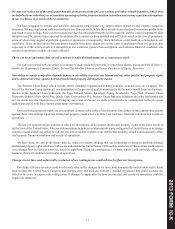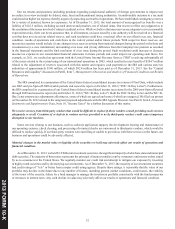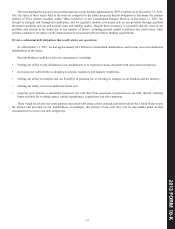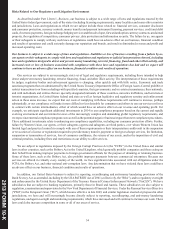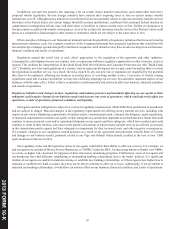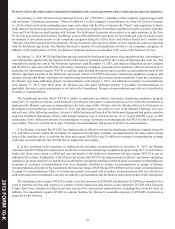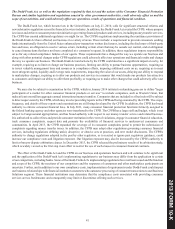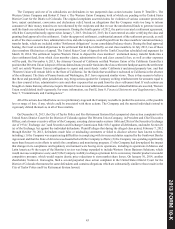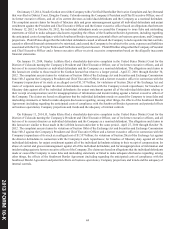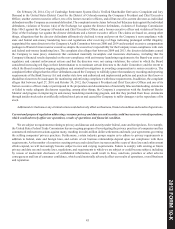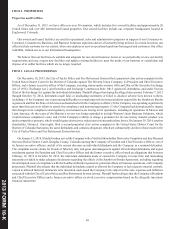Western Union 2013 Annual Report Download - page 151
Download and view the complete annual report
Please find page 151 of the 2013 Western Union annual report below. You can navigate through the pages in the report by either clicking on the pages listed below, or by using the keyword search tool below to find specific information within the annual report.
2013 FORM 10-K
41
The Dodd-Frank Act, as well as the regulations required by that Act and the actions of the Consumer Financial Protection
Bureau and similar legislation and regulations enacted by other government authorities, could adversely affect us and the
scope of our activities, and could adversely affect our operations, results of operations and financial condition.
The Dodd-Frank Act, which became law in the United States on July 21, 2010, calls for significant structural reforms and
new substantive regulation across the financial services industry. In addition, the Dodd-Frank Act created the CFPB, whose purpose
is to issue and enforce consumer protection initiatives governing financial products and services, including money transfer services.
The CFPB has created additional regulatory oversight for us. The CFPB's regulations implementing the remittance provisions of
the Dodd-Frank Act have affected our business in a variety of areas. These include: a requirement to provide consumers sending
funds internationally from the United States enhanced pre-transaction written disclosures, including the disclosure of third-party
fees and taxes, an obligation to resolve various errors, including certain errors that may be outside our control, and an obligation
to cancel transactions that have not been completed at a consumer's request. In addition, these regulations impose responsibility
on us for any related compliance failures of our agents. These requirements have changed the way we operate our business and
along with other potential changes under CFPB regulations could adversely affect our operations and financial results and change
the way we operate our business. The Dodd-Frank Act and actions by the CFPB could also have a significant impact on us by, for
example, requiring us to limit or change our business practices, limiting our ability to pursue business opportunities, requiring us
to invest valuable management time and resources in compliance efforts, imposing additional costs on us, requiring us to meet
more stringent capital, liquidity and leverage ratio requirements, impacting the value of our assets, delaying our ability to respond
to marketplace changes, requiring us to alter our products and services in a manner that would make our products less attractive
to consumers and impair our ability to offer them profitably, or requiring us to make other changes that could adversely affect our
business.
We may also be subject to examination by the CFPB, which in January 2014 initiated a rulemaking process to define "larger
participants of a market for other consumer financial products or services" to include companies, such as Western Union, that
make at least one million aggregate annual international money transfers. Companies that are included in a final rule will be subject
to direct supervision by the CFPB, which may involve providing reports to the CFPB and being examined by the CFPB. The scope,
frequency, and details of these reports and examinations are still being developed by the CFPB. In addition, the CFPB has broad
authority to enforce consumer financial laws. In July 2011, many consumer financial protection functions formerly assigned to
the federal banking agency and other agencies were transferred to the CFPB. The CFPB has a large staff and budget, which is not
subject to Congressional appropriation, and has broad authority with respect to our money transfer service and related business.
It is authorized to collect fines and provide consumer restitution in the event of violations, engage in consumer financial education,
track consumer complaints, request data and promote the availability of financial services to underserved consumers and
communities. In April 2013, the CFPB expanded the coverage of its consumer complaints portal to permit the submission of
complaints regarding money transfer issues. In addition, the CFPB may adopt other regulations governing consumer financial
services, including regulations defining unfair, deceptive, or abusive acts or practices, and new model disclosures. The CFPB's
authority to change regulations adopted in the past by other regulators, or to rescind or ignore past regulatory guidance, could
increase our compliance costs and litigation exposure. Our litigation exposure may also be increased by the CFPB's authority to
limit or ban pre-dispute arbitration clauses. In December 2013, the CFPB released the preliminary results of its arbitration study,
which is widely viewed as the first step in an effort to restrict the use of such clauses in consumer financial contracts.
The effect of the Dodd-Frank Act and the CFPB on our business and operations has been and will continue to be significant
and the application of the Dodd-Frank Act's implementing regulations to our business may differ from the application to certain
of our competitors, including banks. Some of the Dodd-Frank Act's implementing regulations have not been issued and the function
and scope of the CFPB, the reactions of our competitors and the responses of consumers and other marketplace participants are
uncertain. Further, and in addition to our own compliance costs, implementation of requirements under Dodd-Frank could impact
our business relationships with financial institution customers who outsource processing of consumer transactions to our Business
Solutions segment. These financial institutions may determine that the compliance costs associated with providing consumer
services are too burdensome and consequently may limit or discontinue offering such services.


